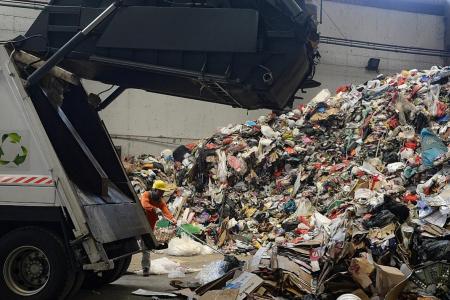Less waste generated, but Singapore also recycled less last year
The Republic may envision itself as a zero-waste nation, but new statistics show the country still has some way to go in achieving this.
Despite the slew of measures to make recycling easier, people recycled less waste last year compared to the year before.
The National Environment Agency's (NEA) website shows 4.72 million tonnes of waste was recycled last year - 50,000 tonnes lesser than the previous year's 4.77 million tonnes.
The decline took place despite national efforts to encourage people to recycle more.
For instance, every HDB block has been provided with a blue recycling bin - up from one bin for every five blocks.
This was implemented in 2014, the same year the Government announced that all new public housing projects will be fitted with recycling chutes, with throw points on every floor.
The chutes are for items such as books and newspapers, plastic and glass bottles as well as paper and plastic trays for eggs.
The NEA said the decrease in waste recycled last year was largely because lower amounts of wood waste, plastic and paper were being recycled.
This was especially worrying in the case of plastics, which harm the environment. Only 51,800 tonnes were recycled last year, down from the 57,554 tonnes in 2016.
About 133,000 tonnes of food waste was recycled last year, up from the 111,100 in 2016.
Food waste, if placed with items that can be recycled, contaminates the whole lot, which the public waste collector then has to dispose of.
NEA attributes the increase to food manufacturers recycling their food waste and greater use of machines that turn food waste into compost.
Overall, Singapore produced less solid waste last year: 7.7 million tonnes or about 110,000 tonnes fewer than the 7.81 million tonnes in 2016. But proportionally, the amount of waste recycled remained unchanged at 61 per cent.
Separately in Parliament yesterday, Dr Amy Khor, Senior Minister of State for the Environment and Water Resources, said last year's domestic recycling rate was 21 per cent, the same as in 2016.
This was higher than the figure cited in recent media reports, which covered only the National Recycling Programme, she added.
Get The New Paper on your phone with the free TNP app. Download from the Apple App Store or Google Play Store now



